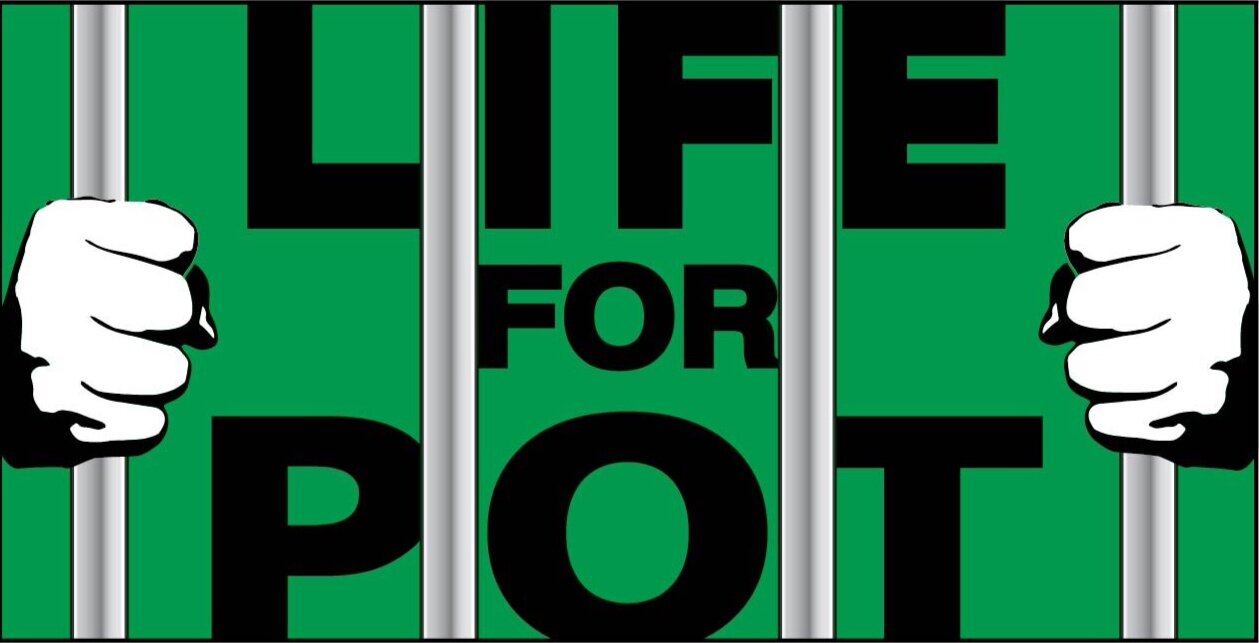Marijuana Legalization - Life for Pot
Today’s
“Cannabis Business Plan”
is Yesterday’s
“Marijuana Conspiracy”
On the first day of market trading for 2019, CNBC interspersed programming with positive stories of the new cannabis businesses. They covered a broad range of the issues startups would face, but the common theme was prosperity and hope. Sam Masucci talked about the new marijuana ETF, Marcus Lemonis explored the marijuana business in Humbolt County for The Profit.
I was ushering in the new year trying to give hope to people serving life in prison for selling marijuana while Jane Wells, Kate Rogers and Aditi Roy were convincing listeners that California’s cannabis commerce would bring promised affluence. As the day wore on, the juxtaposition was as incredible as my conclusion – today’s cannabis business plan is yesterday’s marijuana conspiracy. Life without parole is death by imprisonment. The people I advocate for, nonviolent marijuana lifers will die in prison while a “new industry” in cannabis takes root.
We hoped that this category of nonviolent prisoner would all receive commutations at the end of the last administration, but they did not. They are aging in federal prisons around the country while they watch the product they were incarcerated for become a mainstream commodity and a source of profit for eager entrepreneurs as well as local and state governments.
Part of the conundrum and the most interesting aspect is marijuana remains on the federal Controlled Substance Act of 1970 as a Schedule 1 Drug. The characteristic of a Schedule 1 drug are:
1. The drug has a high potential for abuse.
2. The drug has no currently accepted medical use in treatment in the United States.
3. There is a lack of accepted safety for use of the drug under medical supervision.
This antiquated scheduling ranks marijuana as more dangerous than OxyContin or Fentanyl. When criminal law cynically ignores the cultural reality, it can only lead to disrespect for the law and those who attempt to enforce it. According to Federal Code, all cannabis business enterprises are criminal.
Marijuana prohibition costs 42 billion dollars per year to enforce. There are up to 500,000 arrests per year by local, state and federal law enforcement. This is an enormous government program. Billions of tax dollars are wasted every year on this incoherent policy (money that could repair a lot of failing bridges). The fix isn’t complicated. Removing marijuana from the Controlled Substance Act’s Schedule and allowing it to be regulated like alcohol is the answer. States are moving in this direction regardless of federal law.
John Knock, my brother, who is interned for two life terms plus 20 years for conspiracy to import pot.
The marijuana prisoners I advocate for are serving life because they were charged with “conspiracy” and became accountable for drugs sold by others, even people they had never met or known.
The marijuana prisoners I advocate for are serving life because they were charged with “conspiracy” and became accountable for drugs sold by others, even people they had never met or known. Conspiracy charges hold them responsible for acts that occurred over a period of years and involve many people. Another common thread is they didn’t plead guilty and they chose to exercise their right to a trial. Legal experts call it the “trial penalty.” Key witnesses against them are usually co-defendants who accept a plea and receive less prison time, government agents, and even witnesses who are testifying for a fee.
These marijuana prisoners all have names and life stories. They have mothers and fathers, wives, husbands, siblings and children who all suffer and wonder why there is no mercy. Their family’s time is spent traveling to a federal prison, being searched and processed, sometimes drug tested, then sitting in a large visiting room with only two hugs allowed and lunch from a vending machine. We are paying dearly for this in federal tax dollars and human dignity. I would like to tell them that they will have a chance to be home with their families before they die. They have been entrapped in a gigantic failed social experiment and their release would bring it all to a harmonious conclusion.
These sentences are not fiscally responsible and are not compatible with our sense that we are a nation of compassion, mercy and justice. These nonviolent marijuana offenders serving life need sentencing relief either through executive clemency or retroactive legislation.
DEA Drug Scheduling https://www.dea.gov/druginfo/ds.shtml
Marijuana’s $42 Billion Question
https://www.forbes.com/2007/09/29/marijuana-laws-work-biz-cx_qh_1001pot.html#42db55355fe8People Still Get Arrested and Punished http://www.drugpolicy.org/do-people-still-get-arrested-and-punished-using-marijuana
Beth Curtis, MSW
Director
Life for Pot
http://www.lifeforpot.com
740 452 2867
Opinion Piece


